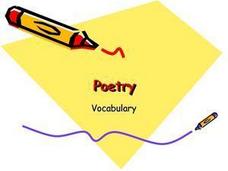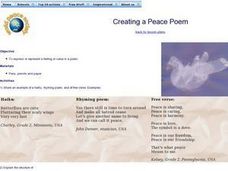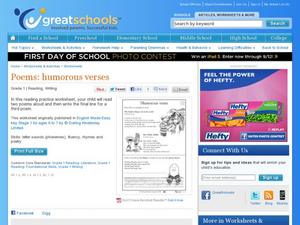Curated OER
Rhythm and Rhyme
Youngsters listen to poetry and music to understand that words are made of sounds. In this rhythm and rhyme lesson, students create songbooks of healthy eating songs. They will also act out pantomimes and dance to the music. Each...
National Endowment for the Humanities
Arabic Poetry: Guzzle a Ghazal!
Learners research the evolution and cultural significance of the Arabic ghazal form of poetry. They, in groups, compose an original ghazal poem and read it aloud to the class.
Curated OER
Poems
Thud! Squiff! Create sound effects with words. Introduce your youngsters to onomatopoeia with these fun, rainy-day poems. They write down sound words, discussing rhythm and rhyme. You can also incorporate the author's use of capital...
Curated OER
Genre Lesson: Poetry
Hook kids into a study on poetry elements by asking them to bring in the lyrics to their favorite song. Discuss the elements in one or two songs (preferably that demonstrate rhyme, figurative language, or a repeating phrase). Groups do...
Can Teach
Groundhog Day Songs and Poems
This Groundhog Day add a bit of rhythm and rhyme with 23 songs and poems that put a spotlight on the holiday's shining star, the groundhog.
Curated OER
Poetry: Walking With My Iguana
Bring a little excitement to your next poetry analysis lesson. Using the highly energetic poem "Walking With My Iguana," learners consider poem structure and rhyme. They listen to the poem, discuss the rhythm and tone with their...
Curated OER
Comparing Poems
Young literary analysts compare two poems by the same author. Readers look for slant rhyme, observe the beat and rhythm of each, and search for repeated vowel sounds. After re-reading, they observe the lack of punctuation and the stanza...
Curated OER
"Music Be the Food of Love:" Found Poetry with Shakespeare and Hip-Hop
Lines from Shakespeare and from hip-hop artists provide learners with an opportunity to examine the literary devices these artists use to express their ideas about love. Groups use the provided lines to craft found poems, and then the...
Penguin Books
A Teacher's Guide to the Signet Classics Edition of Poems by Robert Frost A Boy’s Will and North of Boston
Here's a must-have guide for instructors who use Robert Frost's poems in their classes. The 24-page guide focuses on poems included in Frost's first two volumes of poems, background information on the poet, and what Frost thought was an...
University of North Carolina
Poetry Explications
Explication may sound like a fancy word, but it's just a fancy way to say analysis. Using a handout on poetry explications, part of a larger series on specific writing assignments, writers learn how to break down and analyze a poem. The...
Curated OER
Rock N Rhythm & Rhyme
Students explore rhyming and rhythm. In this rhythm and rhyme lesson, students listen to the song, "A-Hunting We Will Go" and add new verses to the song with words that rhyme. Students use an interactive tool to create these new verses.
EBSCO Industries
Music and Poetry
Song lyrics, like poems, are meant to be heard. After examining the literary devices in several poems, scholars examine the lyrics of popular songs and identify the sound devices and the figurative language writers use to create the...
Geography 360°
Poetry Writing
Put the tips and tricks in this guide into practice in order to encourage your pupils to blossom into poets. A wonderful reference material for teachers, this packet includes definitions of poetic terms and forms as well as step-by-step...
Annenberg Foundation
Rhythms in Poetry
Rhyme, rhythm, free verse, imagery: Do these words describe poetry, or jazz music? The answer is both! A resource explores these similarities as scholars watch a video, engage in discussion, read author biographies, write poetry and...
Curated OER
Poetry Notes
Break this presentation into two or three days so as not to overwhelm your kids. Fifty-four slides is a lot of slides, but the PowerShow is well-organized, and terms are defined clearly and illustrated in examples provided. A general...
Curated OER
Poetry Vocabulary
Consisting of a thorough and straightforward list of poetry terminology, the first part of this presentation would be a good introduction to a poetry unit, or a review for an upcoming poetry project. The list of terms is quite extensive,...
Curated OER
Creating a Peace Poem
Second graders write a poem using words from a list and practice poetic forms. In this lesson on writing a peace poem, 2nd graders brainstorm words or phrases associated with "peace." Students choose a poetic form to express their...
Poetry4kids
How to Write a Repetition Poem
A repetition poem is the focus of a lesson that challenges scholars to compose an original piece. To add meaning to their poem, authors choose words to repeat at the start of most lines.
Curated OER
Japanese Poetry: Tanka? You're Welcome!
Students explore tanka, a form of Japanese poetry. They read and analyze tankas to determine the structure and intent, and compose a traditional and a non-traditional tanka.
Curated OER
A History of Poetry
What has rules and has no rules? What has rhythm and rhyme, and no rhythm or rhyme? What is arranged carefully and is scattered? Why, poetry, of course. Although text-heavy, this PowerPoint does provide a context for the study of poetry...
Curated OER
Elements of Poetry
Prepare your learners to identify figurative language in poetry. Tips for reading poetry and what to look for are listed on these slides. Rhetorical devices are defined and plenty of examples are given.
Curated OER
Poetry As Oral Performance
Reciting poetry is a great way to build oral language skills and build classroom community. Pupils look at the text elements of poetry and choose a poem to read aloud. They focus on rhythm, fluency, and expression. This is a great way to...
National Council of Teachers of English
Writing Poetry with Rebus and Rhyme
Young scholars write rhyming poems using rebus. With pictures instead of words, authors create original work about things they love.
Curated OER
Poems: Humourous Verses
First grade is a great time to build strong reading skills. Here are three short rhyming poems or common nursery rhymes that are intended to help boost reading fluency. Because most children know these rhymes, they will have an easier...

























